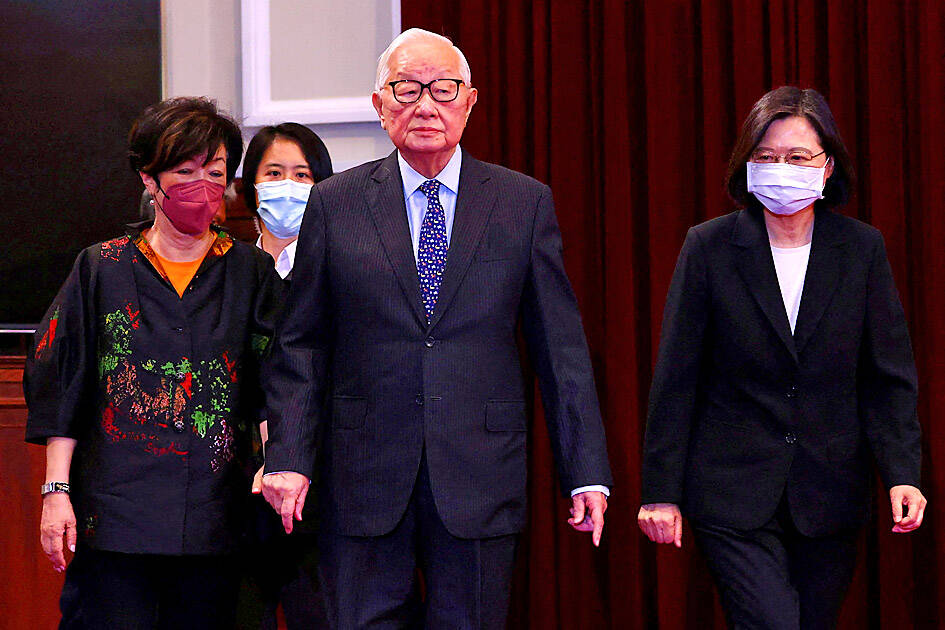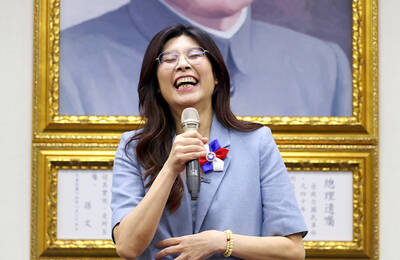Taiwan Semiconductor Manufacturing Co (TSMC, 台積電) founder Morris Chang (張忠謀) is to tout Taiwan’s semiconductor industry at next month’s APEC summit, President Tsai Ing-wen (蔡英文) said yesterday.
Tsai addressed a news conference at the Presidential Office, announcing that Chang would represent Taiwan at the APEC economic leaders’ meeting in Bangkok on Nov. 18 and 19.
Chang would be representing the nation for the sixth time at the summit and the fifth time during Tsai’s administration.

Photo: Ann Wang, Reuters
However, it is only the second summit he would be attending in person, after Chile canceled the 2019 summit due to public unrest, while the past two editions were held online due to the COVID-19 pandemic.
The nation’s presidents are barred from attending APEC summits due to Chinese opposition.
Tsai tasked Chang with conveying three messages to other APEC leaders during the summit, which is also to be attended by US Vice President Kamala Harris and Chinese President Xi Jinping (習近平).
First, Taiwan’s delegation should call on APEC members to recognize “differences of opinion” within the region and seek to strike a balance between free trade and fair competition, as well as between supply chain security and efficacy, and economic development and sustainability, she said.
Second, they should call attention to Taiwan’s “key influence” in global supply chains — especially in semiconductors — while conveying the nation’s willingness to work with regional partners to build safe, reliable and resilient supply chains, Tsai said.
Third, the delegation should express Taiwan’s determination to pursue sustainable economic development while also pushing for a green transition, workers’ welfare, women’s empowerment and social welfare, she added.
Chang told Tsai that he was honored to accept the appointment.
APEC is especially important at this challenging time and is perhaps the most important international forum for Taiwan to attend, he said.
Chang said he would convey Taiwan’s desire to build safe and resilient global supply chains with reliable partners, especially in semiconductors.
He said Taiwan has already done a lot to mitigate the effects of climate change, but it still has a long way to go, adding that the delegation would share Taiwan’s achievements with other nations.
Chang vowed to convey Tsai’s messages to other leaders at the summit, as well as during bilateral meetings and informal events to be held on the sidelines.
Minister Without Portfolio John Deng (鄧振中) and National Development Council Minister Kung Ming-hsin (龔明鑫) are also to attend, the Presidential Office said.

The combined effect of the monsoon, the outer rim of Typhoon Fengshen and a low-pressure system is expected to bring significant rainfall this week to various parts of the nation, the Central Weather Administration (CWA) said. The heaviest rain is expected to occur today and tomorrow, with torrential rain expected in Keelung’s north coast, Yilan and the mountainous regions of Taipei and New Taipei City, the CWA said. Rivers could rise rapidly, and residents should stay away from riverbanks and avoid going to the mountains or engaging in water activities, it said. Scattered showers are expected today in central and

COOPERATION: Taiwan is aligning closely with US strategic objectives on various matters, including China’s rare earths restrictions, the Ministry of Foreign Affairs said Taiwan could deal with China’s tightened export controls on rare earth metals by turning to “urban mining,” a researcher said yesterday. Rare earth metals, which are used in semiconductors and other electronic components, could be recovered from industrial or electronic waste to reduce reliance on imports, National Cheng Kung University Department of Resources Engineering professor Lee Cheng-han (李政翰) said. Despite their name, rare earth elements are not actually rare — their abundance in the Earth’s crust is relatively high, but they are dispersed, making extraction and refining energy-intensive and environmentally damaging, he said, adding that many countries have opted to

SUPPLY CHAIN: Taiwan’s advantages in the drone industry include rapid production capacity that is independent of Chinese-made parts, the economic ministry said The Executive Yuan yesterday approved plans to invest NT$44.2 billion (US$1.44 billion) into domestic production of uncrewed aerial vehicles over the next six years, bringing Taiwan’s output value to more than NT$40 billion by 2030 and making the nation Asia’s democratic hub for the drone supply chain. The proposed budget has NT$33.8 billion in new allocations and NT$10.43 billion in existing funds, the Ministry of Economic Affairs said. Under the new development program, the public sector would purchase nearly 100,000 drones, of which 50,898 would be for civil and government use, while 48,750 would be for national defense, it said. The Ministry of

UNITED: The other candidates congratulated Cheng on her win, saying they hoped the new chair could bring the party to victory in the elections next year and in 2028 Former Chinese Nationalist Party (KMT) lawmaker Cheng Li-wun (鄭麗文) yesterday won the party’s chair election with 65,122 votes, or 50.15 percent of the votes. It was the first time Cheng, 55, ran for the top KMT post, and she is the second woman to hold the post of chair, following Hung Hsiu-chu (洪秀柱), who served from 2016 to 2017. Cheng is to succeed incumbent Eric Chu (朱立倫) on Nov. 1 for a four-year term. Cheng said she has spoken with the other five candidates and pledged to maintain party unity, adding that the party would aim to win the elections next year and